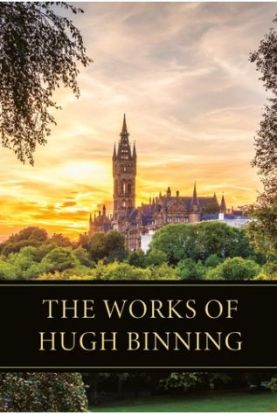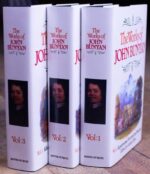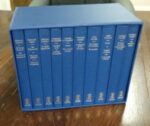save
$13.00The Works of Hugh Binning
$42.00$55.00
Hugh Binning (1627-1653) lived at a time when politics and religion were inexorably intertwined. Binning trained as a Philosopher – believing that philosophy was the servant of theology but that both should be taught in parallel. Binning’s writing forms an important bridge between the 17th century, when philosophy in Scotland was heavily dominated by Calvinism, and the 18th century when there was a greater degree of independence between theology and allied philosophy.
Of Binning’s speaking style, it was said: “There is originality without any affectation, a rich imagination, without anything fanciful or extravert, the utmost simplicity, without a thing mean or trifling.” – The Religious Magazine, 1830
Only 1 left in stock
The Works of Hugh Binning
Hugh Binning (1627-1653) lived at a time when politics and religion were inexorably intertwined. Binning trained as a Philosopher – believing that philosophy was the servant of theology but that both should be taught in parallel. Binning’s writing forms an important bridge between the 17th century, when philosophy in Scotland was heavily dominated by Calvinism, and the 18th century when there was a greater degree of independence between theology and allied philosophy.
Of Binning’s speaking style, it was said: “There is originality without any affectation, a rich imagination, without anything fanciful or extravert, the utmost simplicity, without a thing mean or trifling.” – The Religious Magazine, 1830
Table of Contents
Preface by the Editor
The Life of Mr. Hugh Binning
1. The Common Principles of the Christian Religion
2. The Sinner’s Sanctuary
3. Fellowship with God
4. Heart Humiliation
5. A Useful Case of Conscience
6. A Treatise of Christian Love
7. Sermons on the Most Important Subjects of Practical Religion
About the Author
Hugh Binning (1627–1653) was a Scottish Covenanter who served as a professor at the University of Glasgow and a minister of Govan. Hugh showed great promise as a student from a young age. He entered Glasgow University at the age of 14 and finished his master’s degree and had become a professor of philosophy at the University by the time he was 19 years old. 2 years later he married Barbara Simpson, the daughter of a minister from Ireland, and they had a son, John. The call to the ministry was strong, though, and so he set to learn theology. When 22 he took up the pastorate at Govan where he served until his death from consumption. All of his writings were collected posthumously.
Endorsements
“It is a rare thing to find someone with the ability to seamlessly weave together the theological with the practical. Writing in a way that engages the mind and captivates the heart, Hugh Binning was able to give expression to the height, breadth, and width of the glorious gospel of Jesus Christ revealed in the full counsel of God. Though his ministry was short-lived, these republished works are the enduring monument to the piety and eloquence of a man who walked closely with God. To read them is to be drawn into the heart of the Christian religion.” — Kyle Borg, pastor, Winchester Reformed Presbyterian Church (RPCNA), Winchester, Kansas
“Hugh Binning’s Works could not come at a better time. In an age of ‘show business’ and frivolous distractions, it is hoped that Binning’s Works will not only revitalize interest in Binning historically, but that it will foster the kind of evangelical piety and deep Calvinism he exemplified in his brief but well-lived life.” — Randall J. Pederson, Ph.D., co-author of Meet the Puritans and Managing Editor, Westminster Theological Journal
“There is a striking freshness in the way that Hugh Binning presents truths commonly handled.”
— Matthew Vogan, general manager of Reformation Scotland
| Weight | 3.22 lbs |
|---|









